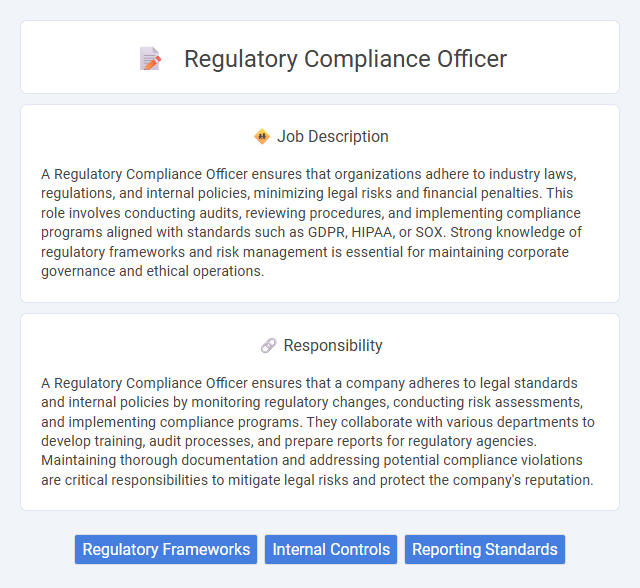
A Regulatory Compliance Officer ensures that organizations adhere to industry laws, regulations, and internal policies, minimizing legal risks and financial penalties. This role involves conducting audits, reviewing procedures, and implementing compliance programs aligned with standards such as GDPR, HIPAA, or SOX. Strong knowledge of regulatory frameworks and risk management is essential for maintaining corporate governance and ethical operations.
Individuals with strong attention to detail, analytical thinking, and a high level of integrity are more likely to thrive as regulatory compliance officers. Those who prefer structured environments and can navigate complex legal frameworks may find this role suitable. People who handle pressure well and possess effective communication skills probably have a higher probability of excelling in this field.
Qualification
A Regulatory Compliance Officer typically requires a bachelor's degree in law, business administration, finance, or a related field, complemented by certifications such as Certified Regulatory Compliance Manager (CRCM) or Certified Compliance and Ethics Professional (CCEP). Experience in risk management, legal frameworks, and industry-specific regulations is essential to ensure organizational adherence to statutory requirements. Strong analytical skills and attention to detail support the effective implementation of compliance programs and auditing processes.
Responsibility
A Regulatory Compliance Officer ensures that a company adheres to legal standards and internal policies by monitoring regulatory changes, conducting risk assessments, and implementing compliance programs. They collaborate with various departments to develop training, audit processes, and prepare reports for regulatory agencies. Maintaining thorough documentation and addressing potential compliance violations are critical responsibilities to mitigate legal risks and protect the company's reputation.
Benefit
A Regulatory Compliance Officer likely enhances organizational adherence to laws and regulations, reducing the probability of legal penalties and reputational damage. This role may improve risk management outcomes by implementing effective compliance programs and monitoring enforcement activities. Organizations could benefit from increased operational efficiency and stakeholder trust through consistent regulatory alignment.
Challenge
Regulatory compliance officer roles likely involve navigating complex and frequently changing legal requirements, making it challenging to stay consistently updated. The probability of encountering ambiguous or conflicting regulations may increase the difficulty in implementing effective compliance programs. Managing risk while ensuring organizational adherence demands strong analytical skills and meticulous attention to detail, which could present ongoing challenges.
Career Advancement
Regulatory compliance officers play a critical role in ensuring organizations adhere to legal standards and industry regulations, which positions them well for career advancement into senior compliance management or risk advisory roles. Gaining certifications such as Certified Regulatory Compliance Manager (CRCM) or Certified Compliance and Ethics Professional (CCEP) enhances credibility and opens pathways to executive positions like Chief Compliance Officer. Expertise in evolving regulations across sectors like finance, healthcare, and technology strengthens career prospects and facilitates leadership opportunities in global compliance strategy.
Key Terms
Regulatory Frameworks
Regulatory compliance officers ensure organizations adhere to laws, regulations, and internal policies, minimizing legal risks and penalties. They monitor evolving regulatory frameworks such as GDPR, HIPAA, SOX, and industry-specific standards to implement effective compliance programs. Expertise in regulatory frameworks enables them to conduct audits, train staff, and liaise with regulatory authorities to maintain corporate integrity.
Internal Controls
A Regulatory Compliance Officer specializing in Internal Controls ensures that organizational processes adhere to legal standards and industry regulations while mitigating risks. They design, implement, and monitor internal control systems to prevent compliance breaches and enhance operational efficiency. Proficiency in risk assessment, audit procedures, and regulatory frameworks like SOX or GDPR is crucial for maintaining robust compliance structures.
Reporting Standards
Regulatory compliance officers ensure that organizations adhere to legal standards and internal policies, with a critical focus on accurate financial and operational reporting standards such as GAAP and IFRS. They monitor and evaluate compliance with regulatory frameworks, prepare detailed reports for regulatory agencies, and implement corrective measures to address discrepancies. Expertise in reporting standards helps mitigate risks of non-compliance penalties and enhances transparency in corporate governance.
 kuljobs.com
kuljobs.com